| Web
and Book design,
Copyright, Kellscraft Studio 1999-2008 (Return to Web Text-ures) |
 (HOME)
|
|
LAKES OF MASSACHUSETTS THE largest bodies of fresh water in
Massachusetts being reservations, boating in a general way is debarred on them.
The lake with the long name briefly called Webster Pond has a contour of
wonderful variety and using Webster as a base one may spend a number of
interesting days in cruising. The lake's cottage life is attractive partly
because there is not very much of it. The group of lakes about Lakeville, south
of Middleboro, is very extensive. Long Pond, Assawomsett Pond, Great and Little
Quittacas Ponds and Pocksha Pond are all situated about a rough quadrilateral.
Some of the islands are sufficiently high to be attractive as residences. An
amusing effort has been made to account for the mildness of the winters in this
region by the large bodies of fresh water. We would think that when a strong
northeast gale was blowing over these ice sheets the fresh water would not
temper the wind to the shorn lamb. There is, of course, a cooling of the air in
the summer quite noticeable when the breezes come from the waters. These
extensive stretches may be mentioned in connection with the entire series of
ponds about Plymouth and the Cape. More and more they will become an important
esthetic feature. Among the hundreds of ponds in the
state, in which particular it is only surpassed by Maine of the New England
states, perhaps the reservoir between Berkshire Village and Cheshire reflecting
as it does the higher peaks of the Berkshire Hills is most picturesque of all.
It may be circuited by a highway whence it is always in view; and its great
length in proportion to its width very much increases its beauty. North
Mountain on one side of it at Dalton is 2220 feet high and on the other side
Savage Hill is 2000 feet in elevation. Various other peaks form a sky outline
as they rise one behind another, of wonderful beauty. Indeed, Cheshire is an
important esthetic center, although perhaps a little north of the fashionable
district. We know no village in the state so close to lofty mountains with the
possible exception of North Adams. But all the way from Cheshire to North Adams
and Williamstown the stream in this deep valley affords a multitude of fine
prospects. The Berkshires are blessed with various little mountain lakes some of them of striking beauty. Running into Tyringham from Lee one finds Goose Pond, Upper Goose Pond and Green Water Pond all nestled among lofty hills and situated so as to summon every romantic instinct. Almost the same might be said of the ponds in Becket. Pontoosuc and Onota Lakes in Lanesboro and Pittsfield are very well known but lack the near and lofty effect of the hills. Worcester and Leicester are environed with ponds, Groton has its fair share as have also Westminster and Ashburnham. In fact the fine sites for homes on lookouts about the large and small bodies of water in the state are numerous enough to satisfy everyone and they are by no means all preëmpted. With the modern tendency to concentrate manufacturing these little lakes will be exempt from unsightly features and so far as their power is utilized its use will not mar their beauty. 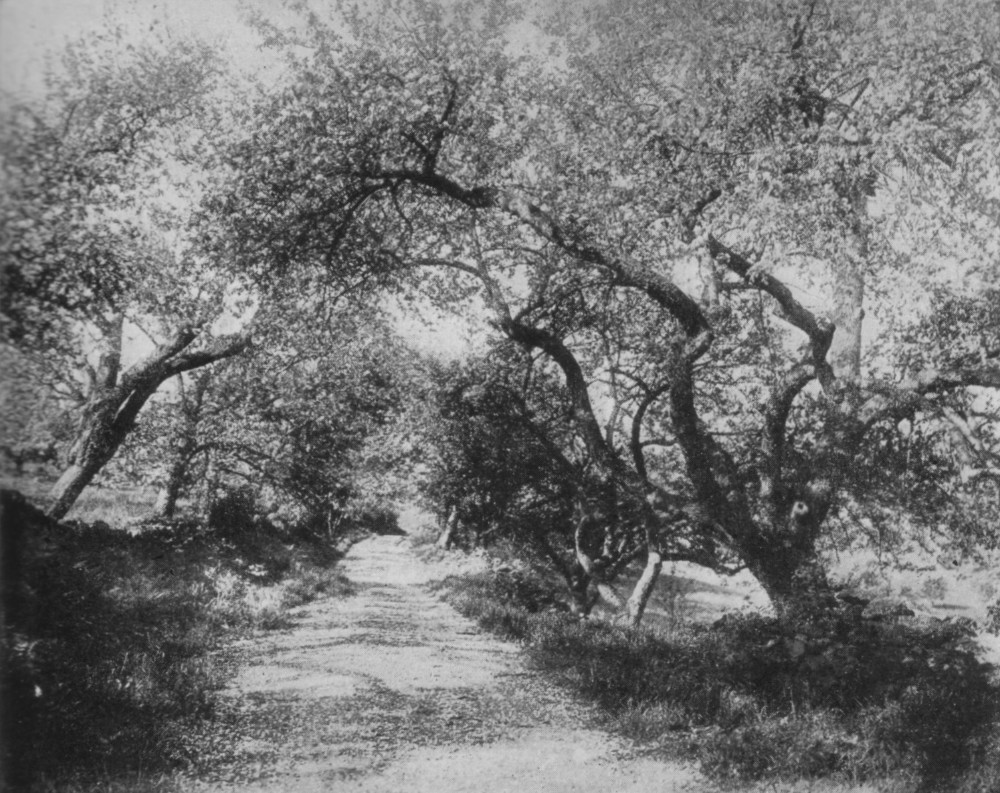 HONEYMOON DRIVE - FRANKLIN COUNTY 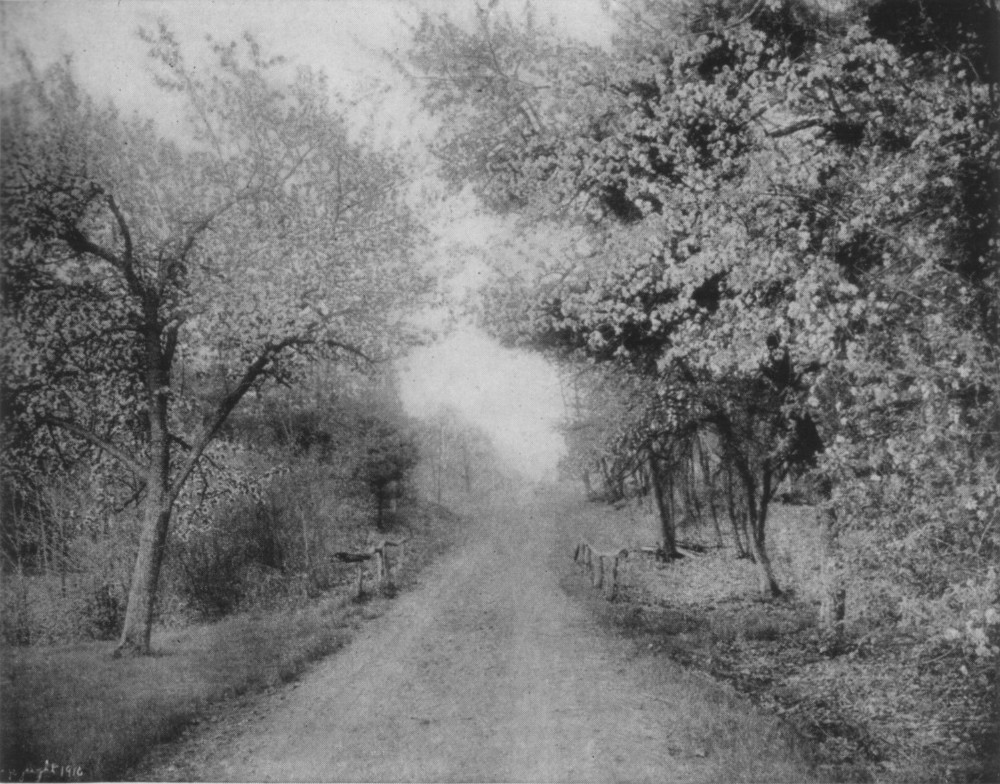 BLOSSOMS THAT MEET - SHEFFIELD 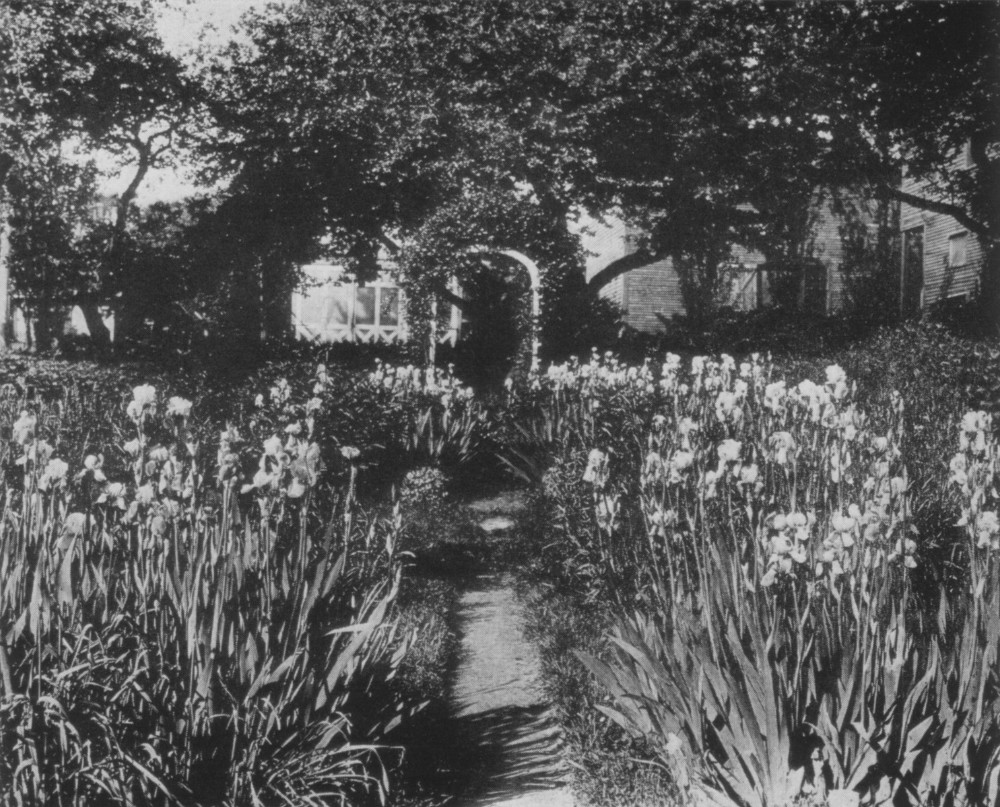 GARDEN SAMOSET INN - PLYMOUTH 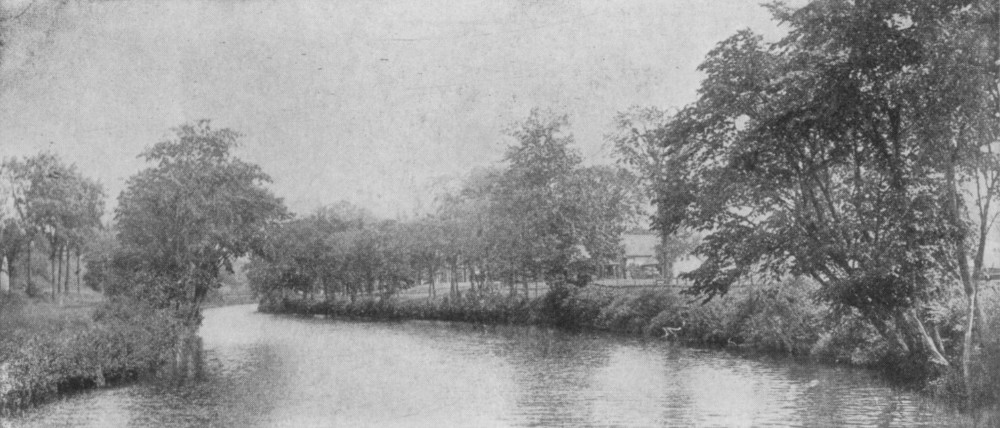 A NASHUA REACH One may almost say that a country
residence is not perfect unless it is within vision of a body of water. That
water need not be extensive but if small it should be close at hand. Nothing
whatever can take the place of water charm. Its mirror calm, its gently
wrinkled surface, changing with infinite variety, gives back to us a succession
of pictures now dreamy, now fantastic, now weird and witchlike. What stillness
is so emphatic as that of a body of water when absolutely unbroken by a breath?
What so fully can dignify and distinguish a landscape as the running margin of
a little lake, here graced by great elms, there by drooping birches, beyond by
clumps of gorgeous maples or the giant and tortuous limbs of a great oak that
have held themselves above the beckoning waters perhaps for centuries. If Americans are ever to take their
birthright to enjoy the beautiful they cannot better begin than by studying the
grace of that line where turf and water meet. ANCIENT
HOUSES ASIDE from general mention in this
volume of early dwellings it will, perhaps, be a boon to the general reader to
have some critical estimates of the best ancient houses in the state. There is in Wrentham an ancient
dwelling which has never been restored or sought so far as we know for that
purpose. It was built in the seventeenth century and the oldest part still has
wooden latches and the raised sill over which one must step. Its back door
lintel is cut in the great chimney girt to give head room. One may express the
hope that a sufficient number of persons of taste for restoring such houses
will, in the process of time, gradually acquire and preserve them all, an
object so laudably sought by the effective and extensive efforts of the New
England Society for the Preservation of Antiquities. There are some houses Gloucester
way, in private hands, which have an overhang on the side and there are two
such houses in Saugus. These go with the Paul Revere House in Boston. The Quincy homestead in the city of
that name is a very large and beautifully located dwelling which has an
increased interest to us because it is composed of additions made at different
periods. The oldest portion places it amongst the earliest in the country and
while the kitchen fireplace is wrongly restored being made too small, a defect
presumably to be remedied, one must always allow for something of this kind. In
fact so rapid has been the increase in knowledge on such subjects and so seldom
has anyone had at once the patience, the means and the enthusiasm that we may
say that we know of no dwelling restored absolutely as it ought to be and
completed. In some cases the errors are not extensive. In other cases work is
in process. The Quincy homestead shows a fascinating
development in one of the front rooms where the great panels about the
fireplace are swung out to show the ancient simpler forms. Either as it is or
as it was the fireplace is excellent. One sees here the beautifully beaded
clapboards and many other features within and without which lead one to return
often. In the same town the Adams houses
though notable historically and very old are extremely simple and have not yet
been fully brought back to their original state. Around one of them there is a
marvelously good piece of stone wall and ancient fence which does more to give
the original feeling of an old country house than any other process whatever. The Fairbanks house, casually
mentioned before, has some features not found elsewhere. A very important
detail is the framing of the interior doors which may exist elsewhere but we
have never seen it. The very instability of the foundation of this dwelling
gave its roof line the remarkable picturesqueness, such as we see nowhere else.
This house is readily seen on the Boston and Providence route. It would be a matter for a huge
volume to mention in detail the merits and romance of all, even of the
seventeenth century houses. But the Manning house in Billerica, a private
dwelling, is most attractive. In Salem, the House of the Seven Gables is perhaps better known than any other New England restoration. Its sharp roof lines with their fascinating variety are fitted to enthrall all old house lovers. In Concord the Old Manse is unfortunately not shown. Its setting and situation by the battlefield make it unique. 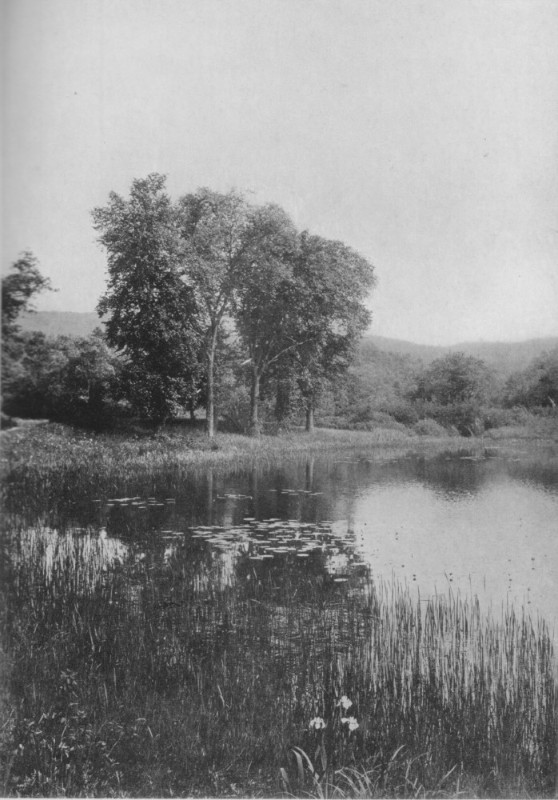 A BERKSHIRE POOL - PITTSFIELD 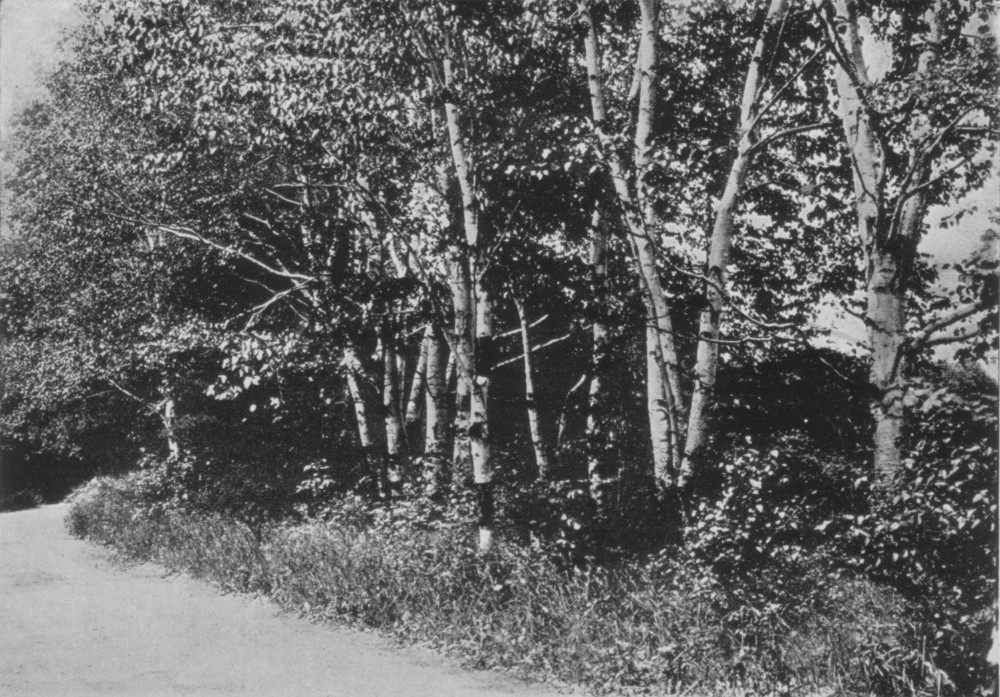 A LENOX ROAD 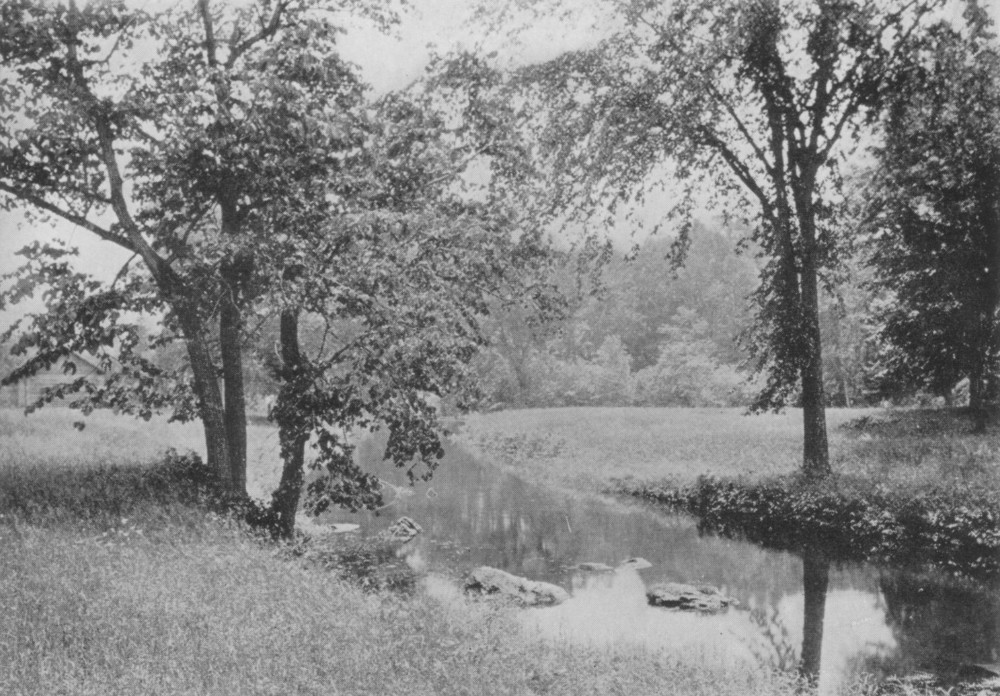 IN WEST PITTSFIELD We show on page eighty-eight a house
at East Haverhill which in its rooms has sheathed panelling of wonderful mellow
yellow of old pine never painted. There are numerous features connected with
this dwelling of importance to antiquarians and it is furthermore picturesque.
It lies also in a fair country. The drives from Rock Bridge are beautiful
though narrow, and other quaint cottages may be detected here and there by
those who are given to searching them out. Very few dwellings in the
Connecticut valley outside of those at Deerfield have been preserved from the
earliest period. The growth of the valley cities has marked old house
destruction. We have elsewhere mentioned many early dwellings. A late house about the beginning of
the nineteenth century is seen on the top of the hill in Brookfield, — the
Chapin place. It is interesting from its extremely ornate door showing the last
flamboyant development of the elliptical window over the door, its side lights
and other features of fenestration. Pictures of doorways have become
very well known as souvenirs and we, therefore, confine ourselves mostly to the
quainter and older examples. Anyone, however, who is at all taken with such
studies could easily spend several seasons in studying the outlines of the
eighteenth century houses in Massachusetts. There are probably more of them of
a good character than in any other state, though the somewhat quainter
dwellings are perhaps more numerous in Connecticut and are to be treated later
on. We have never tallied the lists of
the historical societies in Massachusetts which maintain old dwellings as
headquarters. It is, however, a very long list. A delightful month, at least,
might be spent exclusively on the visitation of such dwellings. None of them
are lacking some important features; some of them are of supreme importance and
interest, and taken as a whole, the study of them undertaken in a broad and
thorough way will initiate any pilgrim from the West into most of the best of
history, romance, architecture and antiquities of earliest America. We do not forget Virginia, but the greater part of the stately dwellings there is of a period rather later than those we have dwelt upon here. ENTRANCE TO THE WAYSIDE INN DIFFERENCES IN TASTE
THE versatility of human nature is
one of its most pleasing aspects, especially when considered in reference to
the location and the sort of homes that people chose. A gentleman of much culture made the remark that his family preferred a house where they could speak across to the back door of their neighbors. This was at least human and gregarious, however much it differs from the Englishman's house-castle idea. The gentleman quoted was frank. Perhaps a great many others have a sly liking for this same sort of a dwelling. At least, a great many people dwell in such conditions and we must believe that what people do continuously they do by preference, not always but generally. 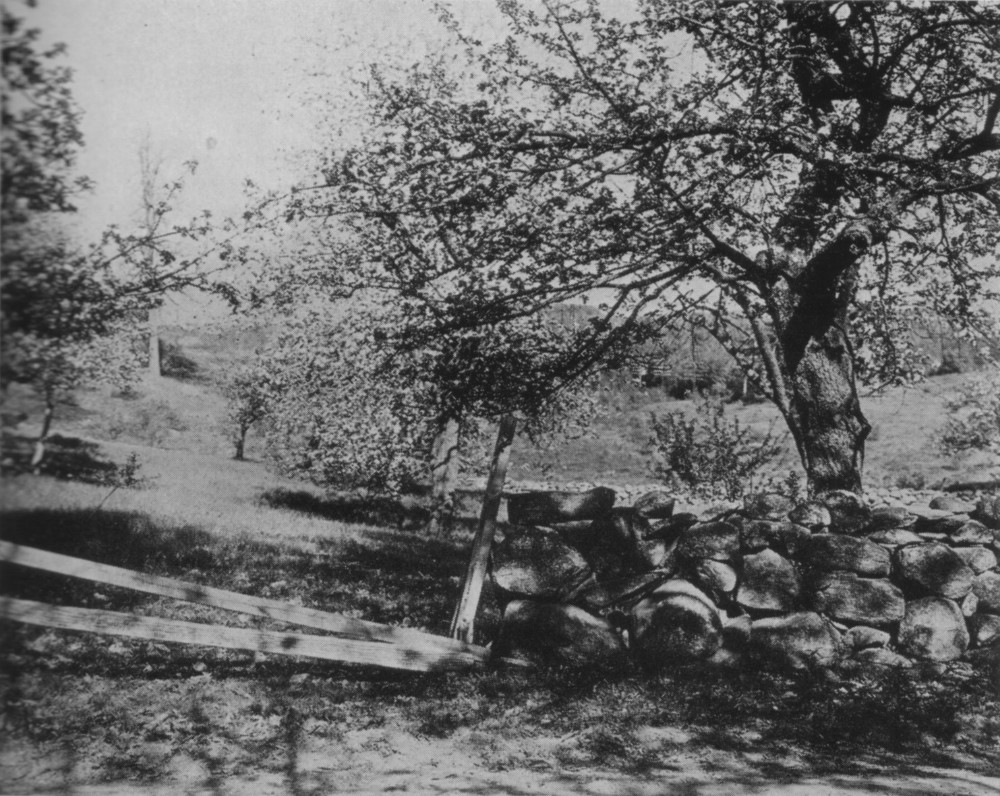 BROOKFIELD BLOSSOMS 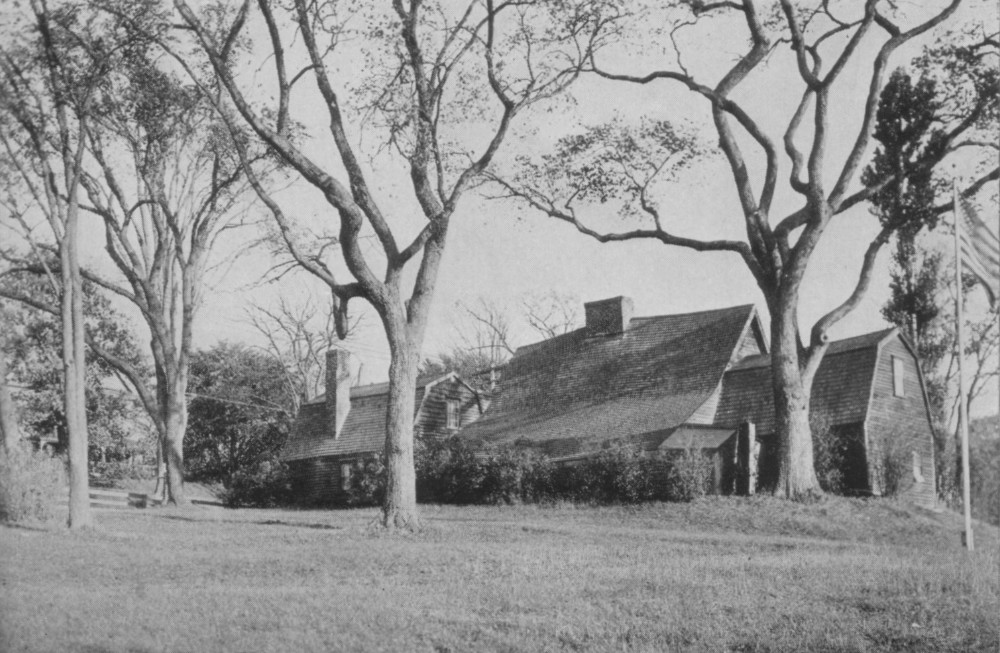 THE FAIRBANKS HOMESTEAD - DEDHAM 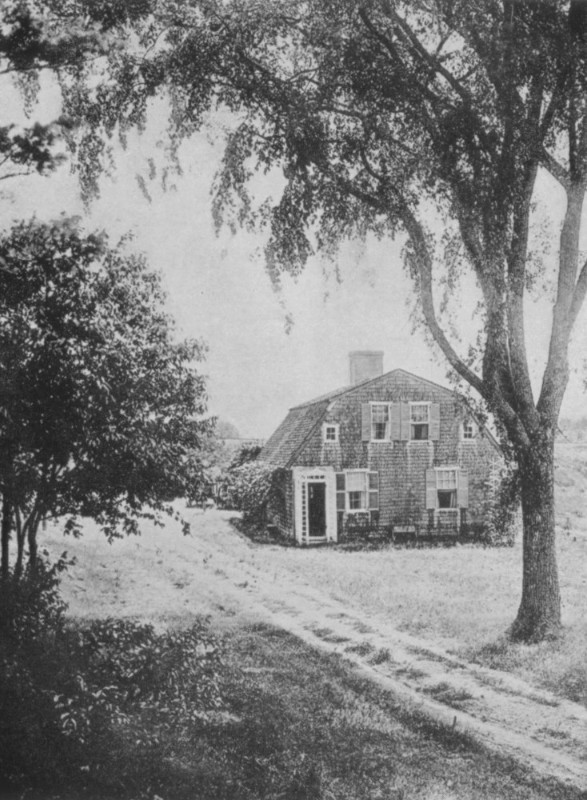 LEOMINSTER COTTAGE 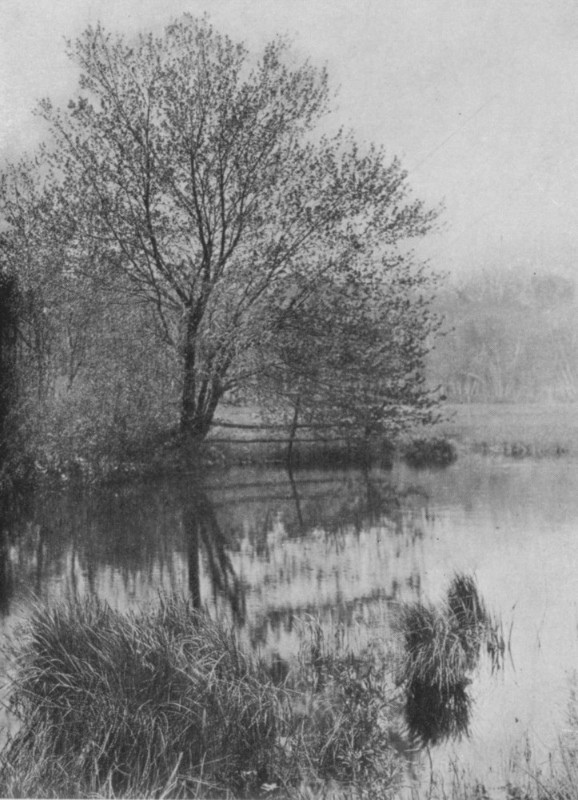 THE POOL'S CORNER We notice also that many dwellings
are erected on land so low that water lies in their cellars, although within a
stone's throw there is higher land. It would be a fascinating study to trace
the stream loving habit back to the beginnings of history. We remember that
various English cathedrals are built on bogs by the side of streams. That at
Winchester, we remember, fell once and would have fallen again for this reason
had it not been buttressed with great care. The water way being the original
road the dwelling was close to the bank partly from convenience and partly from
the love of human association. A study of old London indicates that much of its
present ground was once under water and the huts by the river were, of course,
its beginning. We have in Boston, the metropolis of
our state, a great area containing the fashionable district which was once
under water. An odd shift of fashion, probably
inaugurated by men of historic imagination, has caused a return to Beacon Hill
which forty years ago had degenerated to a region of cheap boarding houses and
often of negro habitation, though its dwellings were architecturally fine. Of
course, Beacon Hill was always as desirable as it is now. It is very near the
State House and in fact the nearest dwelling house district in the city to the
great centers of banking and trade. It required strength of mind to bring about
the present desirable state of affairs. But whatever induced people to leave
quarters so nearly ideal if anything in a city can be ideal? How much taste
influences fashion is a nice question. In this case once the ball was set rolling
everything was in favor of the return to this neighborhood. It is true that the
Fenway district in Boston has charms if one is near some of its redeemed
waterways. But we are reminded that just now one of our friends was warned out
of an apartment in the Fenway district in order that the sagging foundation
might be reinforced. Everywhere men have first collected
for commercial reasons by the banks of streams. Though in the feudal era the
tops of hills were chosen as citadels, the town has been on the low lands and
it is in the low lands that the best soils for cultivation lie. It is probable
that the habit of living on low land is so thoroughly ingrained in human nature
through a myriad of generations of evolution that it will never be eradicated. Wherever
we journey we find the great aggregations of population are in the valley. In our book on Vermont we have taken
up quite thoroughly the motives that induced country settlements on hills in
portions of New England. But the matter of taste in the location
of a dwelling is we fear, or should we say we hope, not so much one of
deliberate choice as a fortuitous occurrence. On first reaching a town with the
purpose of settlement a family is most likely to take up what they think of as
temporary quarters and these quarters are near the center. Habit does the rest.
We would gladly believe that most human dwellings as we see them are not
deliberately chosen but are considered as make-shifts. Whether they are so
considered or not we can give them no other name. Probably the most stinging
disgrace in America today is the shoddy character of its dwellings. Yet these
dwellings cost infinitely more than in any other region on earth, but the
French and for the most part the English and other civilized peoples build
their dwellings to last. Apart from the matter of dwellings the divergence of human tastes in the matter of recreation is amusing. What would make a perfect summer for one would be very nearly perfect torture for another. We revert in the summer to our primeval tastes and perhaps the majority of men in their love for fishing and hunting merely prove that the occupations of their ancestors still call them. Perhaps it is only a perch or a squirrel that is brought back but fine air and exercise and an opportunity to be poetic and romantic as well as esthetic has been afforded. Perhaps it would be better not to inquire too particularly how far advantage is taken of these opportunities. It is none of our business, most would say, what they are thinking about or whether they are thinking at all. They are resting from thinking and reverting to a dreamy past. They are allowing their ragged nerves to knit again by sheer neglect. We have friends who spend their summers hunting prehistoric Indian graves. Others will search through ten states for a butterfly. Why not? Before we condemn the childishness of pleasures we should remember that the more idle the pleasure the more wise it may be. If men do not know what amuses them how can we tell them? Of course our own pleasures are the only wise ones. But in all seriousness those pleasures which open some avenue of the natural world are certainly highly rational and happily to most are interesting. We are still of the opinion that to a great majority there are better things than spending one's summer shuffling cards. 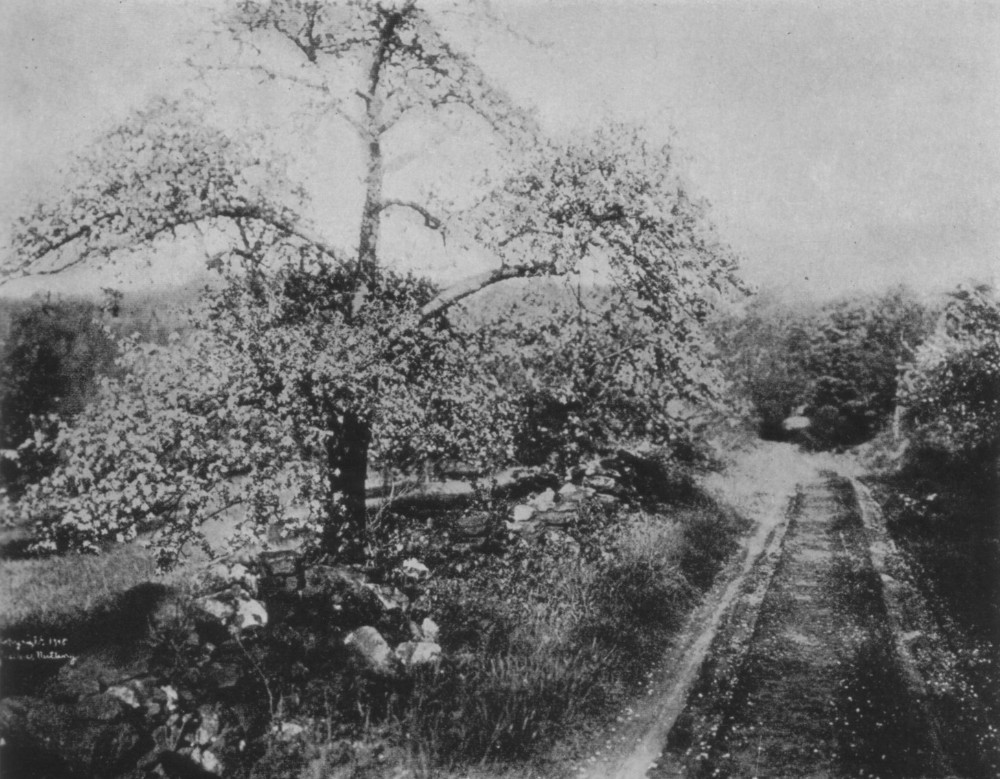 A CROSS-COUNTRY ROAD - FRANKLIN COUNTY 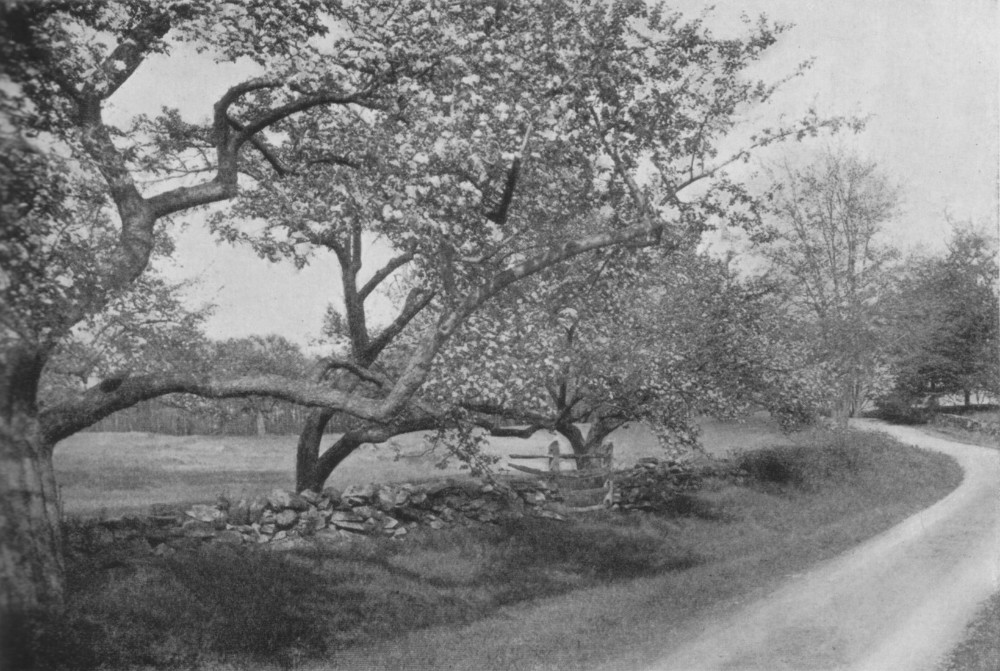 MANY HAPPY RETURNS - HARVARD 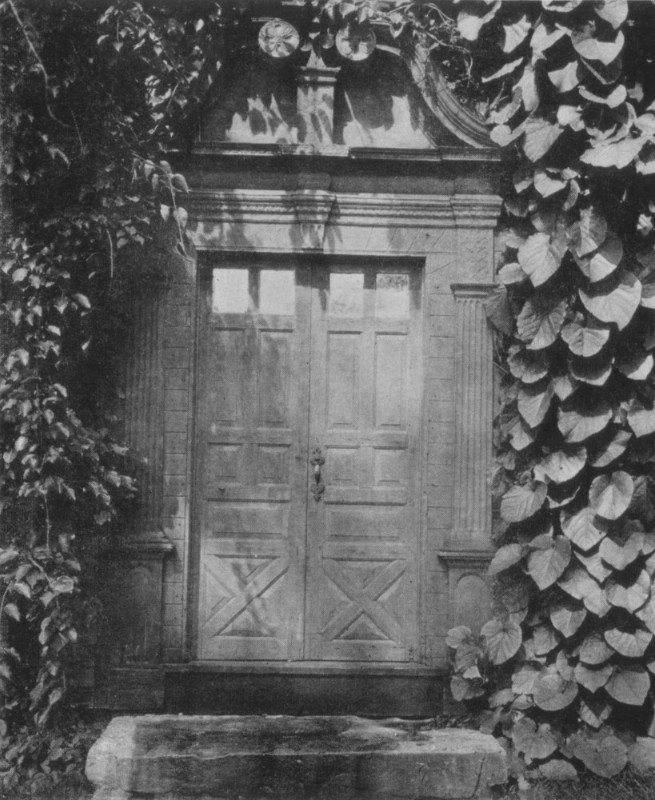 THE MISSION DOOR - STOCKBRIDGE 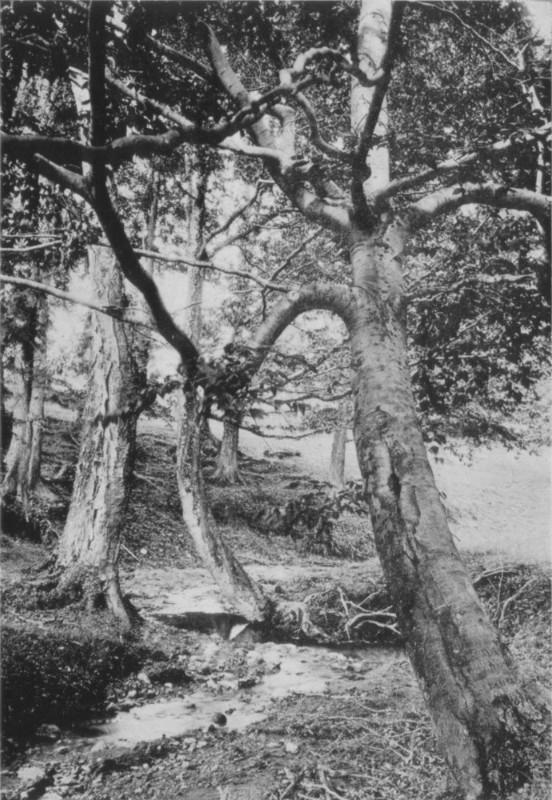 BERKSHIRE VILLAGES BEACHES It is said to be a time of faddists.
Every human frame must have something taken out of it or a gland put into it.
Every school, whatever the multiplicity of its curricula, should according to
some learned men take on one or two more branches. Even old Jonathan Edwards
preached a sermon on the sin of failing to sing in meeting whether one could
sing or not. If he converted everyone to the effort of trying could any
sensitive person have borne it? Every great man is a little of a fool, and if
he is a very great man he is in some particulars also a great fool. It is only
mediocre people who never do anything silly. We are a little weary of those
persons who test everything by sound common sense or tradition or any other
standard except decency. It is by the faddist and the extremist that various
avenues of human experiment have been followed out. Thus the sum of human
knowledge is increased and if some follow a blind alley they may at least
report the fact. The learned man whose strange occupations are such a wonder to
the farmer is not so big a fool as he seems. He is simply thinking in one
direction while the farmer thinks in a direction equally important for the
progress of humanity. Just now we are told there is an epidemic of Egyptian styles with their harsh and lean angles and semi-barbaric uncouthness against which all mouths are supposed to be closed because these things showed the climax of Egyptian art. We object to the fallacy that art is not to be challenged. No permanent harm can come of uncouth tastes. They are like the measles and must have their run. Nations must get them out of their systems. A QUINCY DOOR As to Massachusetts Beautiful the
lack of good taste or its confinement to a few objects or localities may hinder
the spread of estheticism till, on a returning tide, beauty claims its own
everywhere. Of course, speaking broadly, every
landscape can be made charming. There is one glory of the mountain and another
of the valley. There is a splendor of the seashore and a rapture in a nook of
the hills. There is a convincing bible in the sky and a philosophy in the
forest. We dwell in a favored land where all tastes may find food and may
embody themselves measurably as they will. We should only remember in practice
that there need be no plague spots of unsightliness anywhere; that poverty does
not necessarily mean dirt or baldness; that the simple life gains as much as it
loses and perhaps many fold more; that the lavish output of wealth develops a
state in certain ways that eventually may turn to good. We set our faces toward the
abolition of smoke and dust. We hope for a universal insistence on roadside
decency and an effort to make the world attractive. We have seen many portents
of failure but we see a multitude more of prophetic success. Even a race so marked by folly as
our own must learn at length that civilization need not be ugly nor politics
base. 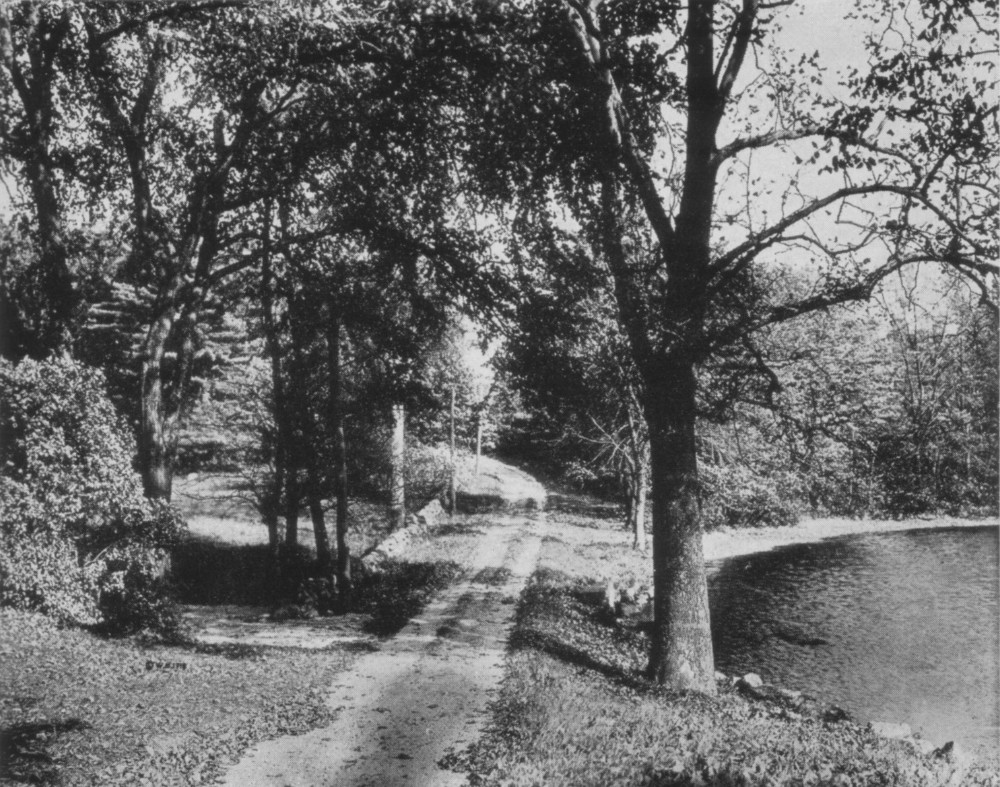 CRESS BROOK ROAD - NORFOLK 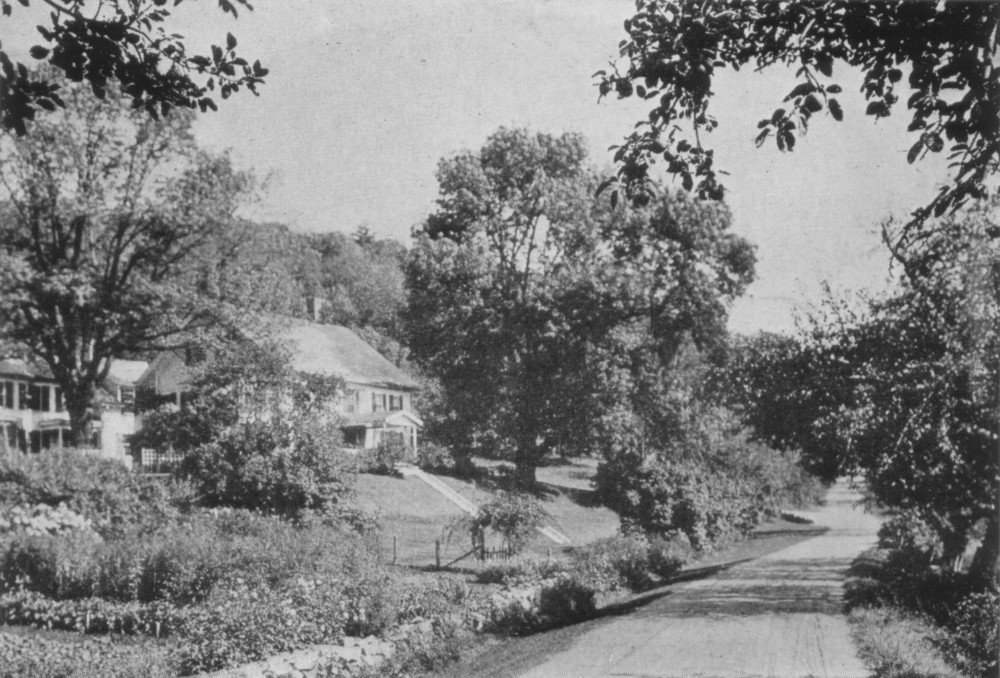 A HOME OVER THE ROAD - MIDDLESEX 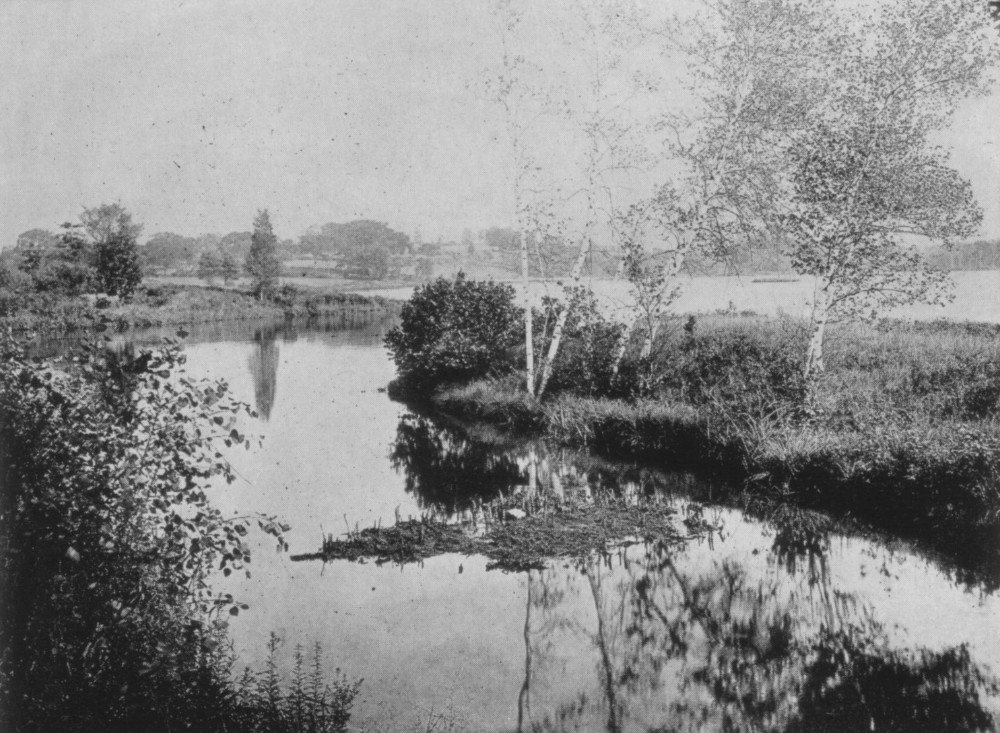 THE LITTLE COVE - BURLINGTON 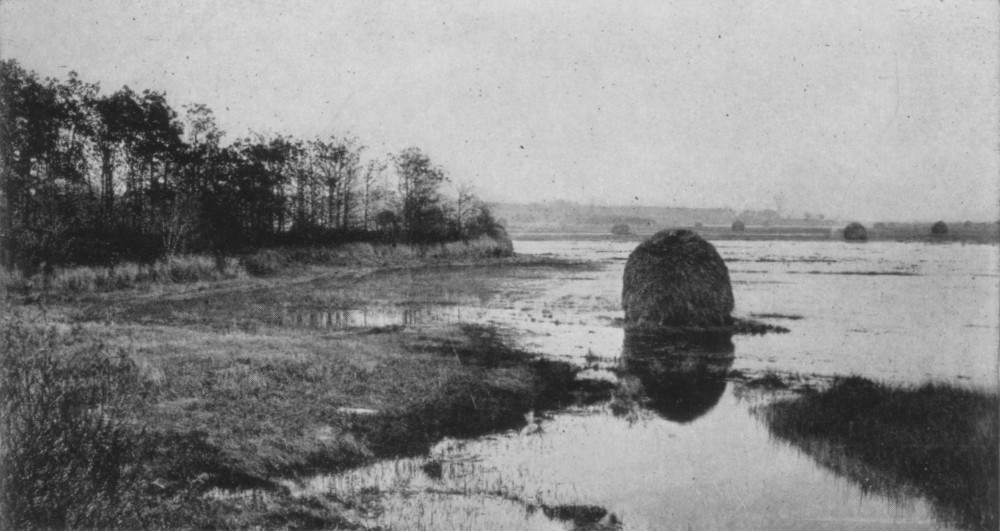 ROWLEY MARSHES THE RIVER CHARLES SOMETHING has been written a long
time since of the River Charles. We think also that a canoe trip over the
length of the stream has been reported. The river with its newly pent in banks
between Boston and Cambridge is an important and attractive feature. As one
ascends it leaving Brookline on the left and Cambridge on the right he passes
then between Watertown and Newton under occasional bridges. The river is beautiful to a degree
in its irregular shores below Riverside between Weston and Newton and again,
between Wellesley and Newton, Echo Bridge has long been a popular point to
visit. The stretches between Needham and
Dedham show occasional bold rock banks and sometimes a marsh. The course of the
river is exceedingly tortuous, and there is an old cut-off in Dedham which
constitutes a large island nearly a mile in its greatest length. The region of Charles River Village
between Needham and Dover is also good. There are considerable marshes between
Dover and Wellesley. The upper reaches from Dover to the
source are less well known but are more beautiful than the region below.
Between Sherborn and Medfield and particularly in Millis there are fine birches
and elms and very many points where an artist, it would seem, should make a
canvas of wonderful beauty. This volume shows several views of
the stream in Millis and Needham. An old dam at Rockville throws the water back
for some miles and various pasture knolls open vistas which in England would be
claimed as advantageous locations for country seats. Through Medway and West
Medway this stream is rapidly coming to the various brooks which form its
source in Holliston, Milford, Bellingham and Franklin. Dover in recent years
and now Millis and to some extent Medfield and Medway, have come to be sought
as the locations of good country homes. It will be a labor of love on the part
of those who come to find the beauties of the Charles and to make them better
known. Massachusetts, aside from the Merrimac and the Connecticut, neither of
which she can claim as wholly or even principally her own, must depend upon the
beauties of the Charles as her principal waterway attraction with the possible
exception of the Housatonic, which also is not wholly within her borders. We recall, in particular, certain
points in Millis near Rockville where the river is unsurpassed as a decorative
landscape feature, reached as it is by soft rolling hills. It is up this stream
that the first and second generations of the settlers came by boat and
established their homes well before the end of the seventeenth century. Some of
the dwellings of that period still remain. The landscape has that air of long
occupation and homelike-ness that we see in England. The gently sloping meadows
and the old stone bridges give an air of continuity and calm. It would be
easily possible to provide a whole volume of illustrations, all beautiful, of
this river and its attractive little tributaries, coming down from Walpole,
Norfolk and Wrentham. That portion of the stream in Cambridge upon which Longfellow looked and that he loved so much is to be preserved as a memorial of that dear spirit. We do not know how much he knew of the river near its source, but ever it is that portion of any stream where the banks are near enough together to be acquainted and where they may talk across as it were that one feels the finest attraction. There is an intimacy and a sense of home waters in the vicinity of a little river. 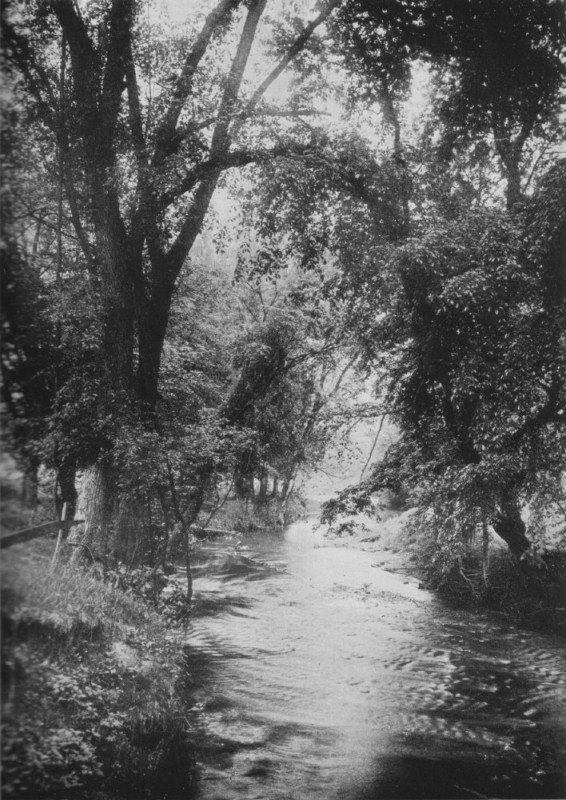 WESTFIELD WATER 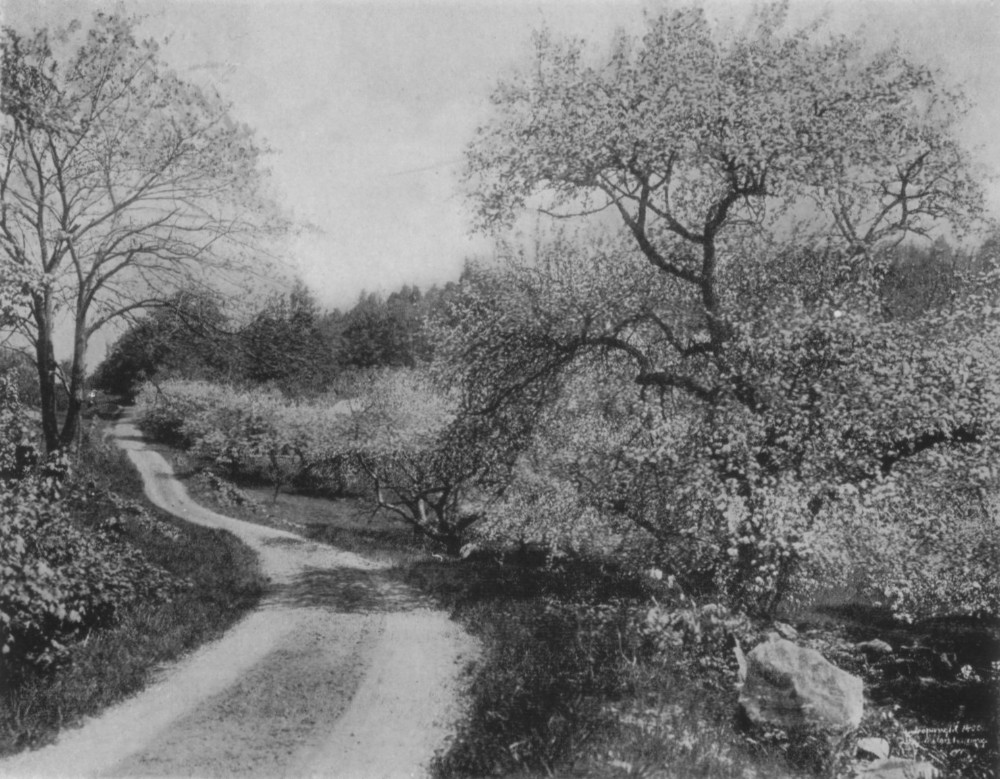 DECKED AS A BRIDE - FRANKLIN COUNTY 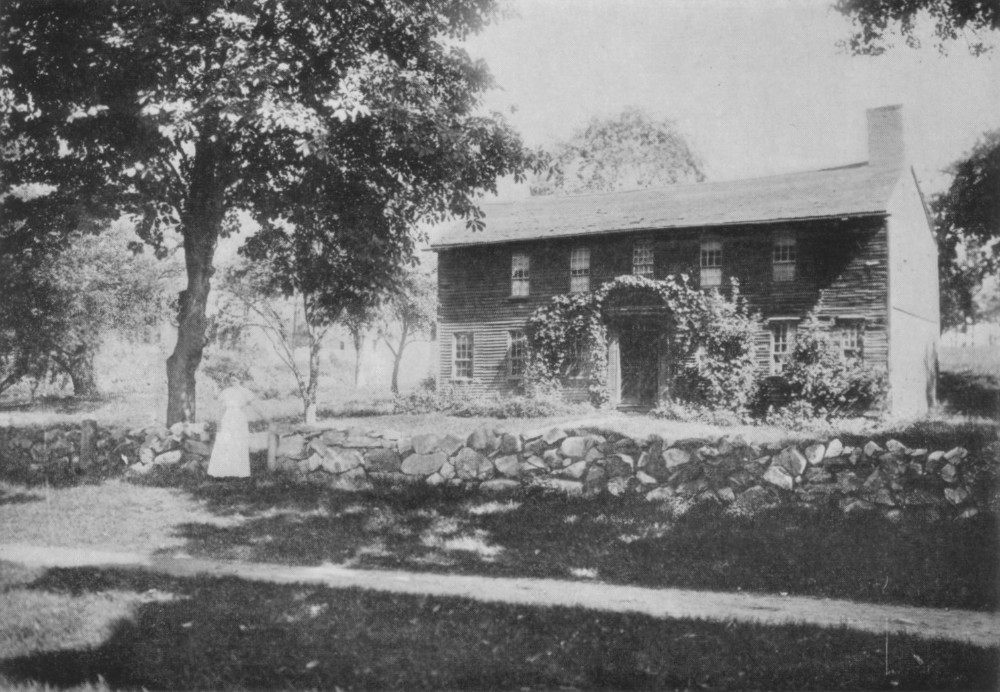 THE SHORT HOUSE - NEWBURY We have sometimes considered the
joyful task of illustrating this stream very fully so as to show a typical
instance to our Western friends of the abounding esthetic features of New
England. One might embark, for instance, on the Mississippi at the southern
point of Minnesota and see merely a dull monotony of shore for thousands of
miles. Mud, snags and featureless sameness, despite a few bluffs of even
outline, would mark his progress to the very gulf. It is something to live in a
country where at every bend of the stream there is a fresh attraction and
inspiration for poet and painter and home maker and a call to that in us which
leads out the more mellow, winning, reflective phases of character. |